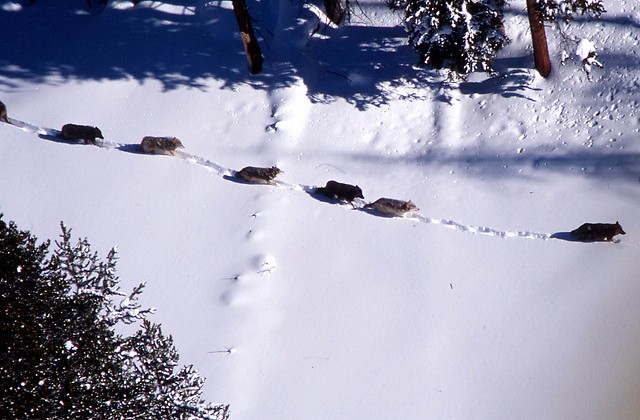Learn more about the campaign to prevent wolf hunts in Michigan:
http://keepwolvesprotected.com/
A petition drive is underway to allow voters to choose whether or not a piece of legislation, which could allow hunters to hunt the gray wolf in Michigan, will stand. The group Keep Michigan Wolves Protected needs to collect more than 161,000 signatures by the deadline of March 27, 2013 to place the referendum on a statewide ballot in 2014. If enough signatures are collected, the possibility of a gray wolf hunting season will be delayed until the vote in 2014.
Michigan Governor Rick Snyder signed a bill last December that placed the gray wolf on Michigan’s game species list. This action did not sanction a wolf-hunting season, but allows for the possibility of creating one, once more is known about the wolf population in Michigan. In January, a decision by the U.S. Fish and Wildlife Service to remove Michigan’s wolves from the federal endangered species list took effect, clearing the way for the Michigan Department of Natural Resources to establish a hunting season.
The gray wolf was placed on the state’s list of protected species in 1965 and on the Federal list in 1973, before the recent removal. There are currently 687 wolves in the Upper Peninsula of Michigan, occupying just 5 percent of their historic range.
Proponents of a wolf-hunting season say that because the wolf is a predatory animal, hunting would control the wolf populations in the U.P. and prevent wolves from killing livestock. However, Michigan law already allows farmers to shoot individual wolves that are attacking or killing livestock or pets. The state government and private funding compensate for the loss of livestock.
Jill Fritz, Michigan State Director of the Humane Society of the United States since 2009, is behind a campaign to stop the possibility of wolf hunts in Michigan. She, like others who support the protection of wolves in Michigan, think it’s best to deal with wolves on an individual basis, and says that wolf hunting won’t stop individual wolves from attacking livestock in the area.
According to Fritz, wolves are an important part of the ecosystem in Michigan because they reduce the deer population and aid in preventing deer-car accidents, they keep deer and moose populations healthy by killing and eating sick or unhealthy animals, and they benefit the forests they inhabit by filling a niche as a predatory animal and keeping the ecosystem healthy.
Wisconsin and Minnesota made provisions for a wolf-hunting season last fall. Hunters are allowed to meet a quota based on the wolf population in a given year. Wolves in these states are caught using legholds, neck snares, firearms, bows, bait, night hunting, and dogs. In Minnesota, 75 percent of wolves were killed in traps, and in Wisconsin, 53 percent were killed in traps.
A 2006 report to the Michigan Department of Natural Resources from the Wolf Management Roundtable suggested that dealing with wolves on an individual basis, as currently allowed, is the best way to deal with the gray wolf, and that recreational hunting of the animal could be considered if wolf-related conflicts arose, but should not be linked necessarily to an increase in wolf population.
The Rapidian, a program of the 501(c)3 nonprofit Community Media Center, relies on the community’s support to help cover the cost of training reporters and publishing content.
We need your help.
If each of our readers and content creators who values this community platform help support its creation and maintenance, The Rapidian can continue to educate and facilitate a conversation around issues for years to come.
Please support The Rapidian and make a contribution today.

